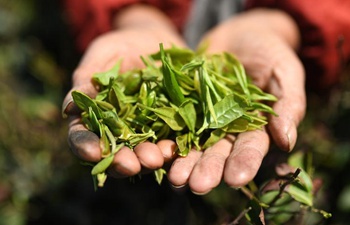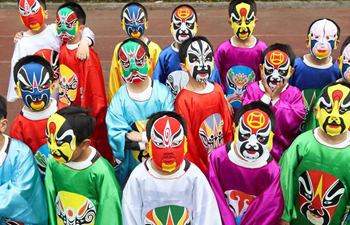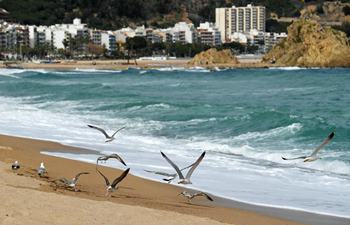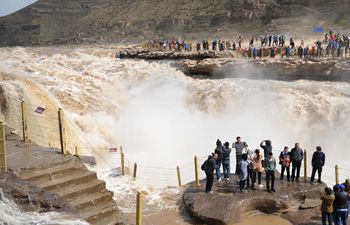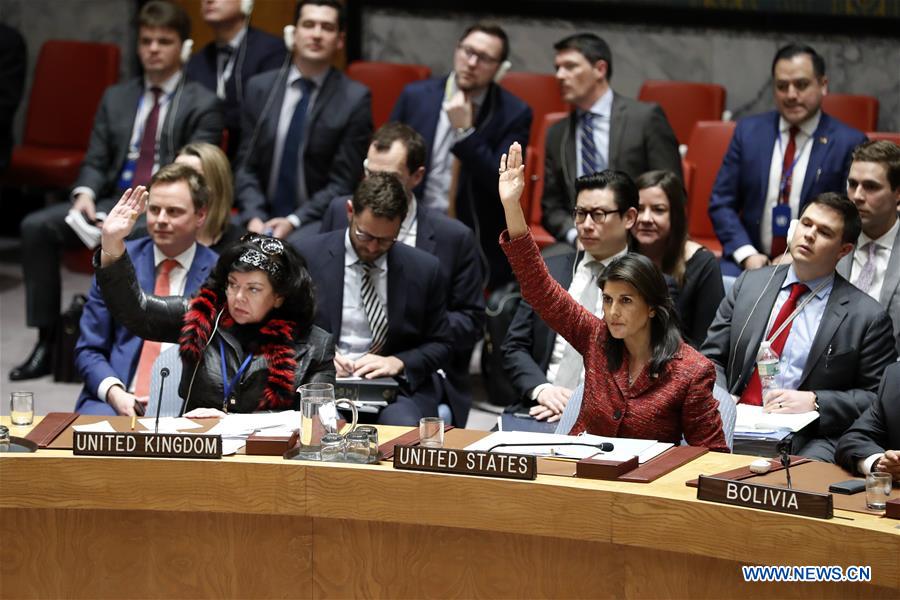 ?
?U.S. Ambassador to the United Nations Nikki Haley (R, Front) and British Ambassador to the United Nations Karen Pierce (L, Front) veto a Russian-drafted resolution on an investigation by the Organization for the Prohibition of Chemical Weapons (OPCW) into the alleged chemical attack in Douma, Syria, at the UN headquarters in New York, on April 10, 2018. The UN Security Council failed to adopt the Russian-drafted resolution on Tuesday. (Xinhua/Li Muzi)
UNITED NATIONS, April 10 (Xinhua) -- The UN Security Council on Tuesday failed to adopt a Russian-drafted resolution on an investigation by the Organization for the Prohibition of Chemical Weapons (OPCW) into the alleged chemical attack in Douma, Syria.
Five countries -- Bolivia, China, Ethiopia, Kazakhstan, Russia -- voted in favor, failing to pass the threshold of nine. Four council members -- Britain, France, the United States and Poland -- voted against it and six others abstained.
Russian ambassador to the United Nations Vassily Nebenzia expressed disappointment at the outcome, arguing that the Russian text was a "repetition" of a Swedish document that was circulated on Monday among council members.
Nebenzia blamed some council members for voting against the text, as he claimed, simply because it was a Russian draft.
Right before the vote on the Russian text, Swedish ambassador to the United Nations Olof Skoog requested a suspension of the Security Council meeting for extra consultations.
"We are at a very fragile phase of council deliberations now and we need to reflect carefully on the way forward to ensure that we don't jump into further paralysis (that is) difficult to defend or repair," said Skoog.
The result of the vote shows that the closed-door consultations did not help to bring about consensus.
The Russian text was amended on the basis of Swedish draft elements circulated on Monday in order to find common ground in the Security Council for an outcome in support of an investigation by the OPCW into the alleged chemical attack in Douma on Saturday.
Russia substantially amended those elements and presented them as a Russian-drafted resolution on Tuesday. Russia requested the draft to be voted on alongside two competing draft resolutions on a broader investigative mechanism for chemical weapons use in Syria.
The two competing drafts, prepared by the United States and Russia respectively, failed to be adopted by the council.
The U.S. draft received 13 votes in favor, but Russia blocked it, using its veto power. Bolivia also voted against the U.S. text.
The Russian-drafted resolution got only six votes in favor, short of the nine voted needed. Besides, veto-wielding Britain, France and the United States all voted against it.





